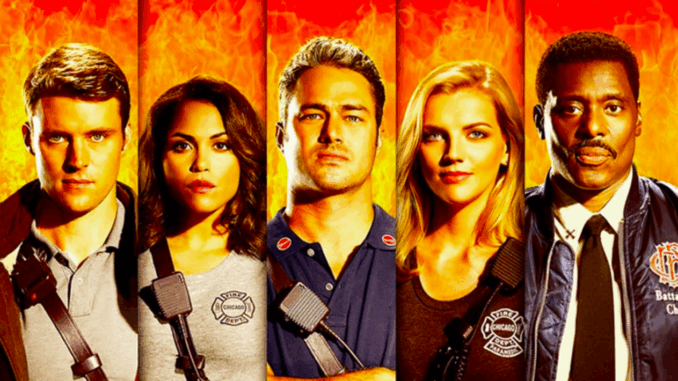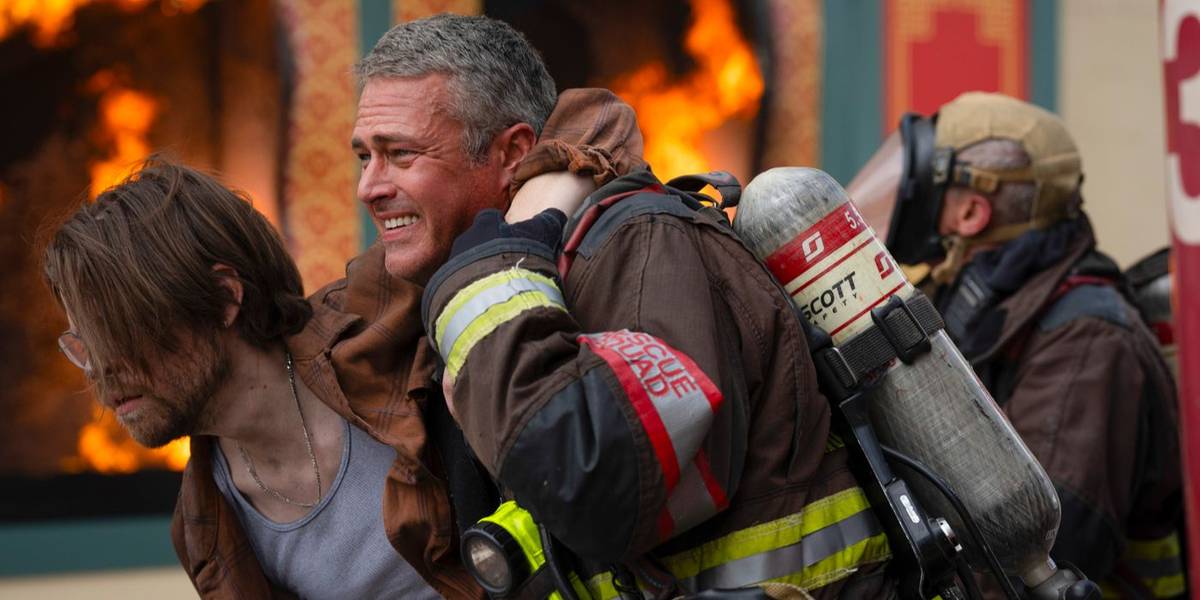
A Franchise Under Pressure
Since its explosive premiere in 2012, Chicago Fire has been more than a TV show—it’s been a cornerstone of NBC’s identity. Alongside its sister shows, Chicago Med and Chicago P.D., the franchise built a loyal audience with heart-pounding rescues, deep emotional arcs, and a genuine portrayal of first responders.
But now, that stability is being tested.
In a surprising turn, NBC renewed all three One Chicago shows for new seasons—while simultaneously announcing a significant round of cost-cutting measures. These decisions are already changing how Chicago Fire is made and experienced, from the number of episodes to the presence of fan-favorite characters.
The Numbers Behind the Cuts
The renewal came with a catch: budget cuts across the board.
According to internal reports and industry sources, NBC executives have imposed the following cost-saving measures:
-
Shorter seasons: Instead of the traditional 22-episode format, Season 14 of Chicago Fire is expected to feature only 13 to 18 episodes.
-
Cast restructuring: Regular cast members may not appear in every episode, depending on scheduling and contractual terms.
-
Salary freezes: Even veteran actors who have been on the show for years are not expected to receive annual raises.
-
Simplified sets and storylines: There’s a renewed focus on character-driven drama over expensive set pieces and elaborate stunts.
These decisions come as part of NBC’s wider effort to manage costs across scripted dramas. But for a franchise built on scope, scale, and emotion, the implications are serious.
The Human Cost: What It Means for the Cast
Fans are particularly concerned about what this means for longtime characters like Severide (Taylor Kinney), Kidd (Miranda Rae Mayo), Cruz (Joe Minoso), and Boden (Eamonn Walker). If actors are only contracted for a limited number of episodes per season, it could result in major shifts to how the stories are told—and who gets the spotlight.
While NBC has stated that it hopes to retain all current cast members, multiple outlets confirm that contract negotiations are ongoing. There is growing speculation that not every major character will return full-time for Season 14.
In a franchise known for emotional consistency and deep bonds between its characters, even a single absence can send shockwaves through the storytelling.
A Shift in Storytelling Style
With tighter budgets and fewer episodes, Chicago Fire will need to adapt its narrative approach.
Rather than sprawling multi-episode arcs with high-concept action sequences, the show may pivot toward smaller, self-contained stories with a tighter focus on a few characters at a time. This could allow deeper exploration of specific dynamics—like Severide and Kidd’s marriage or Mouch’s recovery from past trauma—but it may also leave ensemble fans wanting more.
Writers will have to make tough choices: Which relationships get screentime? Which characters are sidelined? Which emergencies feel urgent enough to feature?
This style of storytelling isn’t new to television—but it is new to Chicago Fire, which has long thrived on interwoven plots and ensemble power.
Streaming Success Offers a Silver Lining

Despite these budget changes, Chicago Fire remains one of NBC’s biggest streaming successes. According to FlixPatrol and Peacock’s Top 10, both Chicago Fire and Chicago P.D. saw a sharp spike in viewership following the renewal announcement—proof that fans remain deeply invested in these stories.
The irony is that Chicago Fire may be more popular than ever, even as NBC is scaling back its resources.
“It’s wild,” one fan posted on Reddit. “Millions of people are watching, and the reward is… budget cuts?”
Still, the surge in streaming numbers could give NBC leverage when negotiating distribution rights or future spin-offs, and possibly justify more investment down the line—if the network sees enough profit margins from digital viewership.
Can One Chicago Stay United?
Another concern is what these changes mean for the interconnected One Chicago universe. Crossover events—once a franchise staple—are already more difficult to coordinate due to scheduling conflicts, separate production timelines, and now, shorter seasons.
Will we still see Fire, P.D., and Med characters teaming up for epic storylines? Or will each show slowly become more siloed as they navigate their own budget limitations?
While no official announcements have been made, industry insiders believe crossovers will be fewer and farther between. The 2024 gas explosion crossover may have been the last large-scale event fans get for a while.
What the Fans Are Saying
Across social media platforms, the reaction to NBC’s strategy has been mixed—hopeful, but anxious.
On Twitter:
“I get it, money is tight. But don’t destroy what makes Chicago Fire special just to cut corners.”
On TikTok:
“If Severide’s only in 5 episodes, I’m out.”
On YouTube reaction channels:
“If they make the stories smaller, fine. But they better not mess with the characters.”
NBC is playing a dangerous game: saving money while risking the loyalty of its most passionate audience base.
Looking Ahead to Season 14
Here’s what we do know about Chicago Fire Season 14 so far:
-
Expected to premiere mid-season (likely early 2026 due to the reduced episode count and production timeline).
-
Writers are crafting episodes that center tightly on character drama.
-
At least one major character may have reduced screentime (though names are not yet confirmed).
-
There’s a push to reintroduce former characters in guest arcs to generate nostalgia and balance out absences.
It’s a season of transition—and everyone from the writers’ room to the firehouse locker room knows it.
Conclusion: Rebuilding in the Ashes
Chicago Fire has been through tragedy, change, and reinvention before. From Leslie Shay’s heartbreaking death to Casey’s exit, the show has weathered storms that would sink other dramas. But this time, the fire isn’t coming from within the script—it’s coming from the top.
Whether NBC’s gamble pays off will depend not just on numbers, but on whether the heart of the show can survive with fewer beats per minute.
The fire is still burning—but the question is, how long can it last under this new reality?